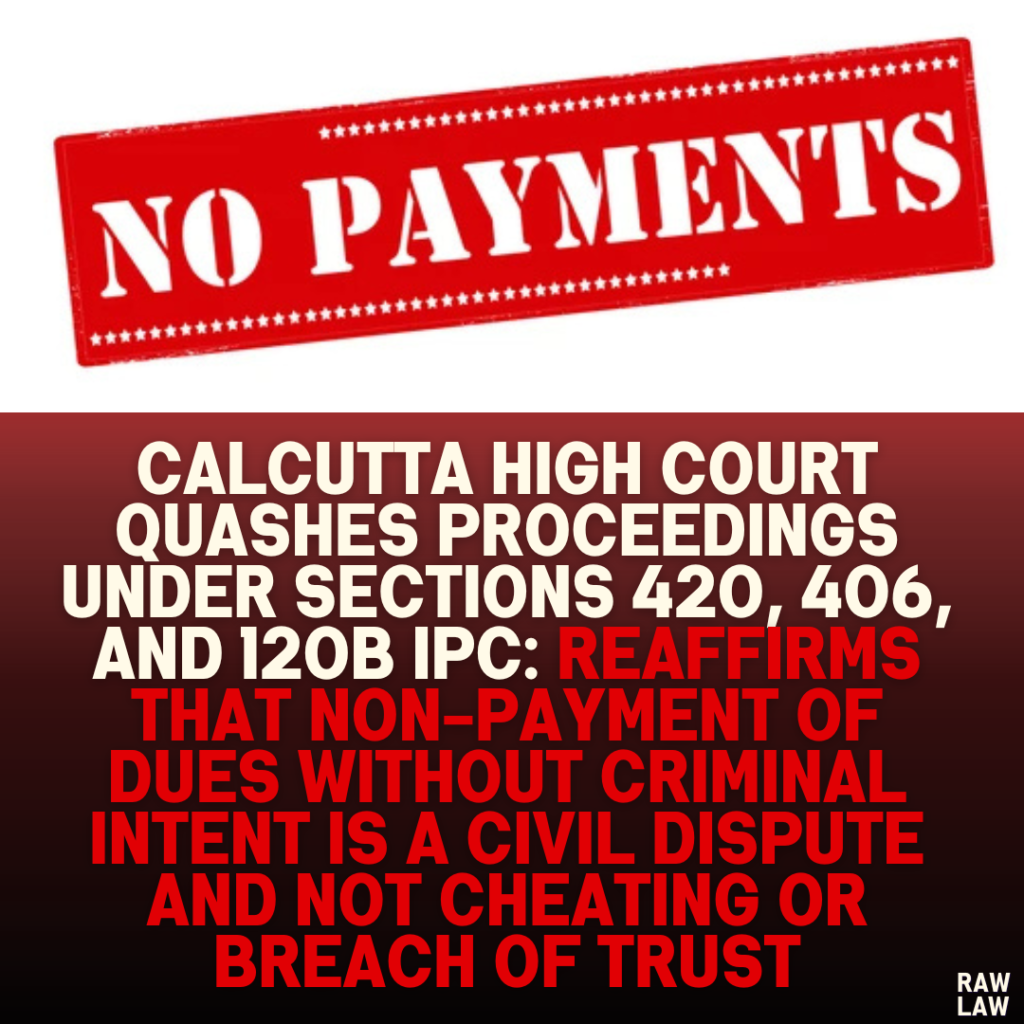Court’s Decision
The Calcutta High Court quashed the proceedings in Complaint Case No. CNS 3902 of 2022 under Sections 420 (cheating), 406 (criminal breach of trust), and 120B (criminal conspiracy) IPC. The court concluded that the allegations arose from a business transaction and did not involve any criminal intent. It allowed the revision petition filed by the petitioners and directed the trial court to close the case.
Facts
- Parties and Allegations:
- The complainant, a partnership firm, alleged that the petitioners, who are directors and key personnel of a corporate entity, approached them with a business proposal.
- The petitioners introduced themselves as officers of a reputable company and induced the complainant to supply wooden packaging materials, assuring timely payment.
- Transaction Details:
- Between December 30, 2017, and July 10, 2018, the complainant supplied materials worth ₹16,74,335.
- Payments of ₹13,06,140 were made, leaving an outstanding amount of ₹3,68,195.
- Complaint Allegations:
- The complainant alleged that the petitioners intentionally avoided paying the remaining amount, deceived them into supplying materials, and falsely assured payment.
- The complaint was lodged under Sections 420, 406, and 120B IPC.
Issues
- Whether the non-payment of dues constituted cheating or a criminal offence under Sections 420, 406, and 120B IPC.
- Whether the criminal complaint was an attempt to use the judicial process to recover dues, which should have been pursued through civil remedies.
Petitioner’s Arguments
- Civil Nature of Dispute:
- The petitioners contended that the complaint arose out of a business transaction, making it purely civil in nature.
- They argued that the dispute was related to the quality of goods supplied, which led to the non-payment of the outstanding amount.
- No Criminal Intent:
- The petitioners asserted that there was no dishonest intention or criminal breach of trust from the inception of the transaction.
Respondent’s Arguments
- Inducement and Fraud:
- The complainant alleged that the petitioners intentionally induced them to supply goods by presenting a false reputation and promising timely payments.
- They claimed the petitioners intentionally withheld the remaining dues to defraud them.
- Criminal Breach of Trust:
- It was argued that the non-payment of dues constituted criminal breach of trust and cheating.
Analysis of the Law
- Key Legal Principles:
- Section 420 IPC: For cheating to be established, there must be deception and dishonest inducement from the very beginning of the transaction.
- Section 406 IPC: Criminal breach of trust requires entrustment of property, followed by dishonest misappropriation.
- Court’s Findings:
- The court found no evidence of dishonest intent or inducement at the inception of the business transaction.
- It noted that there was no entrustment of property, making the offence under Section 406 IPC inapplicable.
- Civil Nature of Dispute:
- The court concluded that the allegations pertained to a business dispute over payment and could not be construed as a criminal offence.
Precedent Analysis
The court relied on several Supreme Court rulings to justify its decision:
- Vijay Dhanuka v. Najima Mamtaj:
Highlighted the misuse of criminal proceedings for settling civil disputes. - Lalit Chaturvedi v. State of U.P.:
Emphasized the need for clear evidence of criminal intent to invoke IPC provisions. - V.Y. Jose v. State of Gujarat:
Reiterated that breach of contract does not automatically lead to criminal liability unless fraudulent intent exists from the beginning.
Court’s Reasoning
- Distinction Between Civil and Criminal Cases:
- The court observed that the dispute was based on non-payment of dues, which is a matter of civil law.
- There was no evidence of fraudulent intent or inducement by the petitioners.
- Abuse of Criminal Process:
- The court held that initiating criminal proceedings for recovery of money amounts to an abuse of the judicial process.
- Relief to Petitioners:
- The court quashed the proceedings to prevent undue harassment and ensure that criminal law is not misused for civil disputes.
Conclusion
The High Court allowed the revision petition and quashed the proceedings. It directed the complainant to pursue appropriate civil remedies for recovering the outstanding amount, rather than resorting to criminal litigation.
Implications
- Significance for Business Disputes:
- The judgment clarifies that business disputes arising from contractual obligations should be resolved through civil remedies.
- It discourages the misuse of criminal law for ulterior motives, protecting individuals from harassment.
- Reaffirmation of Legal Principles:
- The decision reinforces the distinction between civil wrongs and criminal offences, ensuring that criminal courts are not burdened with matters that lack criminal intent.
This detailed breakdown covers every aspect of the judgment, emphasizing the court’s reasoning and its implications for similar disputes.
